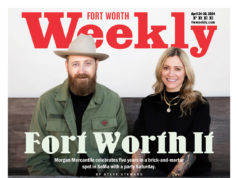The classical music scene in Fort Worth is all too often one of weak attendance figures and stale, centuries-old programming. Last Tuesday’s performance of Dracula: The Music and Film by Philip Glass and his namesake ensemble was a refreshing reminder that classical music can still have vibrancy and immediacy and still connect with people of all ages and backgrounds.
And, perhaps as a result, Bass Hall was packed. One look at the crowd told you all you need to know. Sure, you had your fair share of blue hairs, but there also was a quorum of skinny-jean-wearing hipsters and even folks in full vampire regalia, giving the elegant hall a refreshing sense of casualness. (If I had been handed a bag of popcorn, I might have taken it without a second thought.)
Accompanying the music was Tod Browning’s 1931 silent film Dracula, rolling across a large movie screen suspended above the stage. To celebrate the 1999 re-release of Browning’s film, Glass –– who has scored several Hollywood blockbusters, including The Hours and The Illusionist –– was commissioned by Universal Studios to compose a soundtrack. As the lights dimmed, six casually dressed men filed out onstage and took their seats.
The famed composer sat at a synthesizer with his signature shock of frizzy hair tumbling outward. For a man whose compositions exude symmetry, balance, orderliness, and poise, he looks frazzled. His ensemble –– conductor Michael Riesman, keyboardist Mick Rossi, and woodwind players David Crowell, Jon Gibson, and Andrew Sterman –– are all active composers and producers in their own right.
At first, it was hard to decide whether to focus on the stage or the screen. The musicians and the movie were all so damn interesting. But after a few minutes, the music began to meld with the film, underlining Glass’ success at blending contemporary music with the narrative artform of cinema. If there’s one composer predisposed to eschew literal interpretations of filmic action, it’s Glass, and true to form, his score avoids cliché –– a deadpan burst of sound when the bloodsucker bursts onto the scene, say, or fluttering melodies for romantic interludes –– and evokes archetypal moods and pure sensations through his manipulation of orchestral tonalities and textures. The results often elevated banal scenes into delightfully surreal visual and auditory tableaux.
As with most of Glass’ work, Dracula features a lot of minor chords. Capable of succinctly conveying melancholy, they create a harmonic bed of eeriness. Other passages pushed the composer to employ consecutive jarring intervals of 2nds and 7ths in atonal arpeggios that swell up and down. The two keyboards functioned as pistons that propelled the music incessantly onward and drove the drama unfolding on screen. And while there are few passages that would qualify as difficult for any professional musician to perform, the performance went off without a hitch. The focus of the night was on a captivating sound, not a technical display that would have detracted from the sublime mood.













I needed to write you this very small remark to help thank
you very much once again for all the splendid methods you’ve shared at this time.